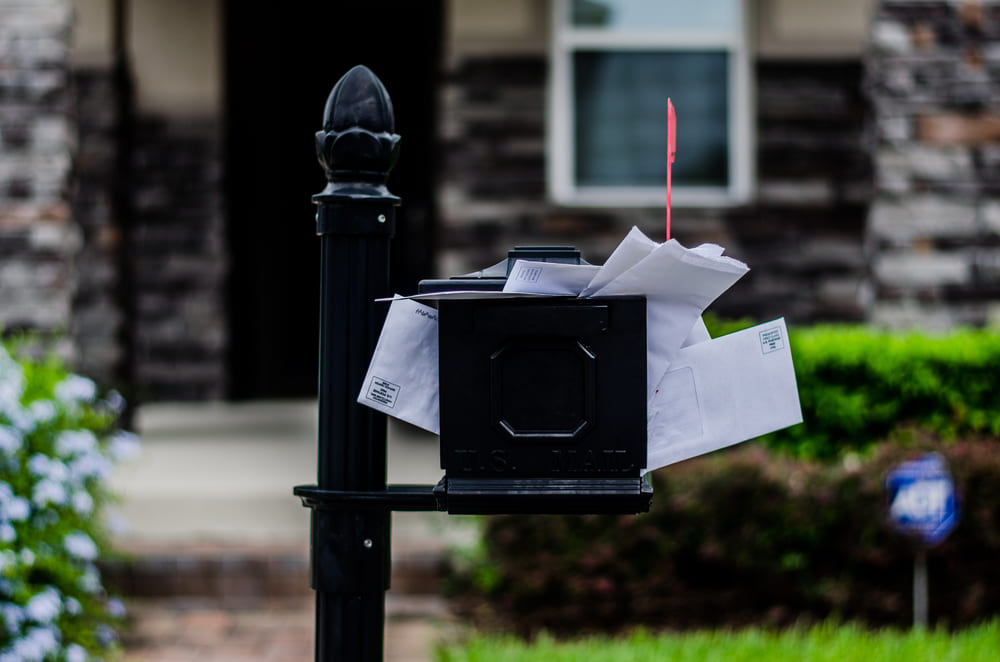
It’s completely normal to receive mail addressed to a previous occupant after buying a house, and you might even notice an increase in junk mail—such as advertisements for lawn care, a home warranty, home remodeling, or pest control.
Closing on a home creates a public record, so anyone can access and get information about you and your property. This includes your full name, home address, and loan amount.
But even though a lot of companies buy information to advertise legitimate services, they’re not always transparent about their services. In addition, others purchase information with the purpose of scamming homeowners.
Here’s a look at different types of junk mail you might receive after buying a house, and how you can protect yourself.
1. Advertisements for mortgage protection insurance (MPI)
Shortly after closing on your mortgage, you’ll likely receive an onslaught of junk mail for mortgage protection insurance (MPI).
This type of insurance pays off your mortgage balance if you die or become disabled. And to be clear, this is legitimate protection. But while these offers might appear to come from your mortgage lender, they actually come from insurance agents.
Mortgage protection insurance is a type of life insurance policy. However, instead of listing your family as a beneficiary, the beneficiary is your lender. So the insurance policy pays your lender directly. The problem, though, is that this type of policy lacks flexibility.
Your family isn’t allowed to use funds for other expenses, plus the policy has a declining payout. Even though your premium stays the same, the payout decreases as your mortgage balance decreases. In which case, it might be better to buy a term or whole life insurance policy.
You can select a death benefit that’s enough to pay off your mortgage “and” provide your family with ongoing financial support.
2. Junk mail/advertisements that look like a bill
Some junk mail can even look like a legitimate bill or notification from your mortgage lender. In fact, some shady advertisers will even use your lender’s logo to trick you.
As far as the contents, a company might offer a service like setting up autopay or a biweekly payment schedule—and then charge you a fee for this. However, you can set up these services directly with your lender at no cost.
A fraudulent company might also send a fake bill, claiming you must pay the amount to record the mortgage with the city, receive a property profile, or get the deed to your house. This is a scam, though. The company disappears once you send the money.
3. Advertisements for a lower rate and payment
You might receive mail stating that you qualify for a lower mortgage rate and monthly payment, and you’re directed to call a given number to claim your offer.
Again, this mail might appear to come directly from your mortgage lender. However, it’s often another mortgage company advertising their loan products.
If you call to inquire about a lower rate and payment, they’ll pitch refinancing your mortgage with their company, or getting another mortgage product like a home equity loan.
How can you protect yourself from mortgage junk mail?
Although you’ll receive a flood of junk mail after closing on a home, never assume that every piece of mail is junk or an advertisement.
Your mortgage lender will send legitimate information through mail, too, especially if you haven’t requested paperless statements. Even so, it’s important to recognize spam or advertisements.
Always read the mail carefully, including the fine print. If it’s spam or an advertisement, you’ll likely notice “salesy” words or language such as “act immediately,” “best offer,” “don’t hesitate,” or “limited number.” Keep in mind, advertisements often include a disclaimer in very small print that discloses the marketing material, usually near the bottom of the page.
It’s also important that you don’t send money or share personal information when you receive unsolicited mail. When in doubt, contact your lender—using numbers listed on their website—to confirm the legitimacy of suspicious mail.
You should also shred spam advertisements to keep your personal information safe, plus there’s the option to opt out of advertisements: optoutprescreen.com or call 1-888-5-OPT-OUT (1-888-567-8688).





